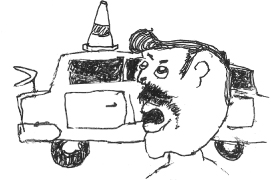
I recently contributed to a forum on ‘The Stigma of Mental Illness’. Shortly before the event I was at a girl’s school in St Albans and attempted to broach the subject with the teenagers.
I mentioned to the students, a character in my work who had a violent aversion to any sort of furniture. Any chair, table or wardrobe, freestanding or fitted. We agreed that he had a Compulsive Obsessive Disorder. I asked the children to describe characters with aversions and compulsions of their own. One of them invented a girl who did not like clocks because they always told her she was late. A strong example of evading the problem by focusing on an effect rather than a cause.
We discussed various conditions and syndromes and it felt that our discourse was increasing understanding and tolerance. One youngster said she knew a person who had Tourette’s syndrome, who would constantly scream out loud for no reason. She said it was the Headmistress.
When I was a schoolchild of nine or ten, there was a man called Bill, who we called Car-Driver Bill, because he would sit on the wall opposite the school gates going through the motions of driving an invisible car. I would always ensure that I passed him on the opposite side of the street, without making eye contact. When my French grandmother visited us, she came up to the school to pick me up and because she was a woman of curiosity, on seeing Bill in action, she recommended we go over and ask him for a lift. Hearing her French accent, Bill said ‘Please climb in, Madame. There’s not a lot of room in these MGBGTs, not even this 3.5 litre model, so it’ll be a bit of a squeeze for one of you in the back, I’m afraid.’
Twenty-five years later, I am in London, going for a job with a theatre company. The director happens to ask where I was educated. When I mention my primary school, she tells me that her husband’s uncle has lived opposite this school all his life. She says that he likes to sit on his outer wall going through the motions of driving an imaginary vehicle. I say, ‘Is his name Bill?’ and she says, ‘Yes it is.’ I say, ‘Is he still driving the MGBGT?’ and she says, ‘No, he drives a truck now, he’s just got his HGV licence.’

It was the greatest pleasure for me to finally come from France to visit you in your home in the English town of Luton and to sit with you and your sister and make masks. The paints which I brought with me, came from the very shop in Nice which provided materials for the French genius of Henri Matisse. So, of course, I had to take them home with me. Henri was the name of your grandfather, my husband. His mother was French as were both of my own parents, so you have three French grandparents and yet your father has not taught you a word of the language.
I also saw that your father has made not one new painting in England. In the 1930s when we returned from the United States, his whole weekends were spent depicting exactly the old town of Nice. He was not a Braque. He was not even a Picasso. I sensed he painted to reclaim his country after seven years of absence. To secure his heritage. To anchor his being. This was the work of his art. It is possible that art can challenge, question, re-evaluate, make money. Your father’s art did none of these, but still he had talent, and if he had persevered he might have been able to support his poor mother whose only pillow is her dog,
Your poor grandmother
